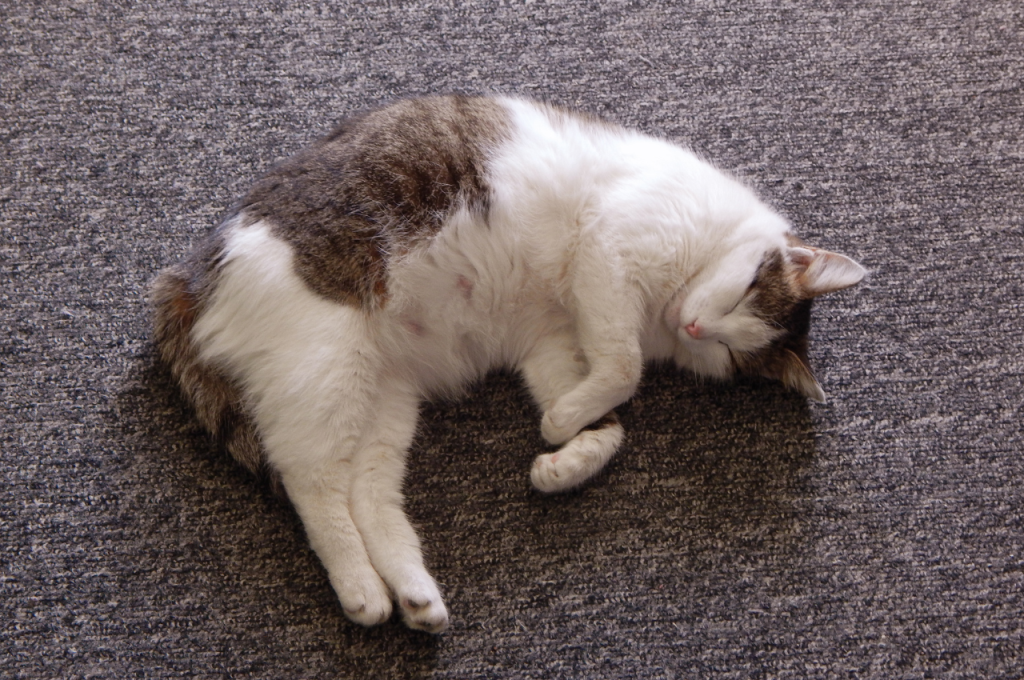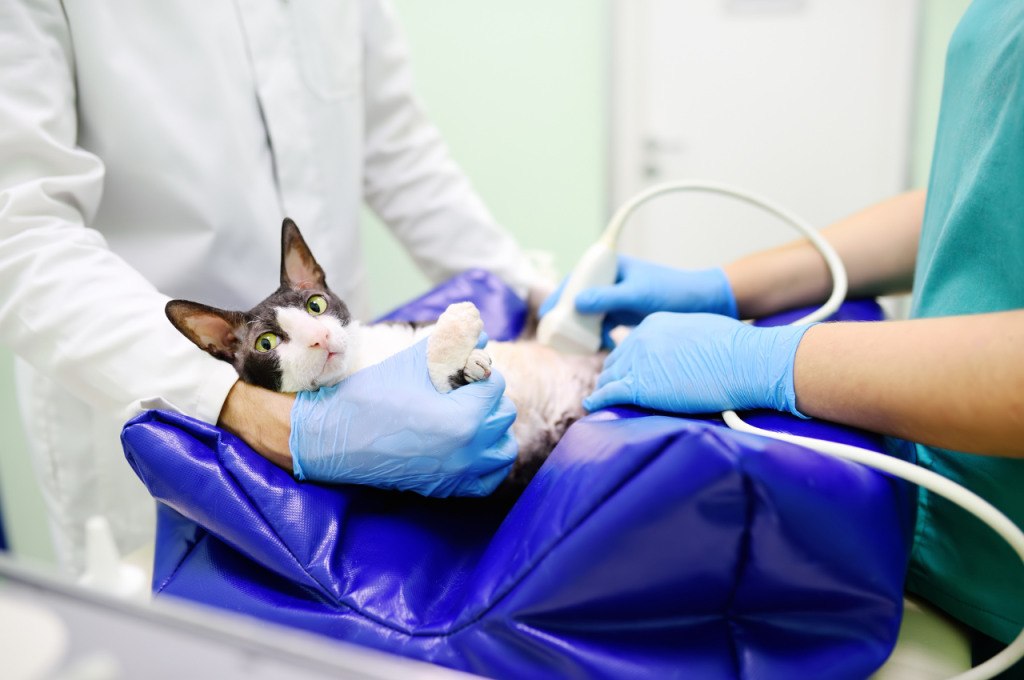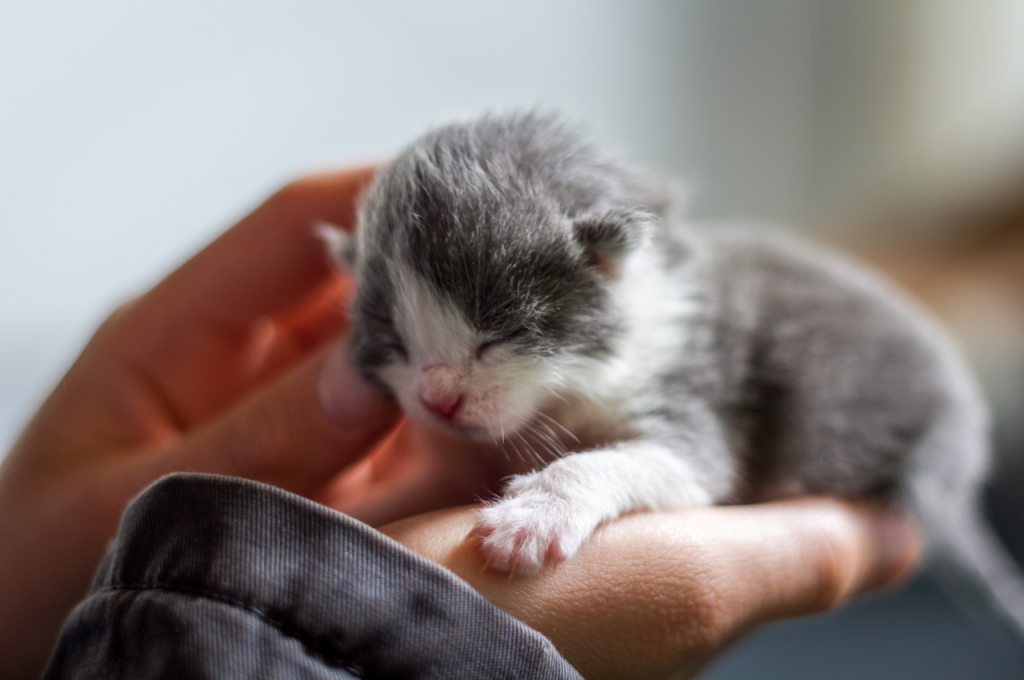To determine if a cat is pregnant, observe for signs like increased appetite, weight gain, and nipple changes. Additionally, behavioral changes and nesting behaviors can indicate pregnancy.
These signs usually appear around 3 weeks after mating. If you suspect your cat is pregnant, consult a veterinarian for confirmation and proper care. Pregnancy in cats typically lasts around 63-67 days, so early detection is crucial for preparing for the arrival of kittens. Monitoring your cat’s health and providing a comfortable environment can help ensure a successful pregnancy and delivery. Remember, professional veterinary guidance is essential for the well-being of your pregnant cat.
Introduction to Feline Pregnancy
Detecting feline pregnancy can be tricky, but there are some signs to look out for. Changes in behavior, appetite, and weight gain are common indicators. Additionally, you may notice her nipples becoming more prominent. Keep an eye out for these signs to determine if your cat is pregnant.

The Basics of Cat Reproduction
Cats are known for their reproductive capabilities, and it is essential to understand the basics of cat reproduction before delving into feline pregnancy. Female cats are polyestrous, meaning they can go into heat multiple times in a year. During the heat cycle, the female cat will mate with a male cat, which can result in pregnancy. The gestation period for cats is around 63-65 days, and during this time, the female cat will display several signs of pregnancy.
Recognizing The Signs of Pregnancy
As mentioned earlier, female cats will display several signs of pregnancy during the gestation period. These signs can vary from cat to cat, but some of the most common signs include:
- Increased appetite and weight gain
- Enlarged and pink nipples
- Abdominal swelling
- Behavioral changes, such as increased affection or aggression
- Nesting behaviors, such as seeking out quiet and secluded areas
If you suspect that your cat may be pregnant, it is important to take her to the veterinarian for confirmation. A veterinarian can perform an ultrasound or X-ray to determine if the cat is pregnant and how far along she is in the gestation period. It is also crucial to provide proper care and nutrition for the pregnant cat to ensure a healthy pregnancy and delivery.
In conclusion, understanding the basics of cat reproduction and recognizing the signs of pregnancy is essential for cat owners. By paying attention to your cat’s behavior and physical changes, you can ensure a healthy and successful pregnancy for your feline friend.
Physical Changes in Your Cat
If you suspect your cat might be pregnant, watch for physical changes such as enlarged nipples, weight gain, and a swollen abdomen. Additionally, you may notice behavioral changes like increased affection or appetite. Keep an eye out for these signs to determine if your cat is expecting.
Cats are known to be quite independent and self-sufficient, which is why it can be challenging to tell if your cat is pregnant. However, there are some physical changes that you can look out for to determine if your furry friend is expecting.
Weight Gain and Enlarged Abdomen
One of the most noticeable changes is an increase in weight and an enlarged abdomen. If you notice that your cat is gaining weight despite maintaining a healthy diet and exercise routine, it may be a sign that she is pregnant. As the pregnancy progresses, her belly will become larger and firmer to the touch.
Changes in Nipple Color and Size
Another physical change to watch out for is changes in your cat’s nipple color and size. As the pregnancy progresses, the nipples will become larger and more pink in color. You may also notice that they are more sensitive to touch. These changes are a result of the hormonal changes that occur during pregnancy. It’s essential to note that not all cats will exhibit these physical changes during pregnancy. Some cats may experience a mild weight gain, while others may not show any visible signs until later in the pregnancy.
Therefore, it’s crucial to keep an eye out for any behavioral changes and consult a veterinarian if you suspect your cat is pregnant. understanding the physical changes that occur during cat pregnancy is crucial to ensure that your furry friend receives the care and attention she needs. By monitoring her weight, abdomen, and nipple changes, you can determine if your cat is pregnant and provide her with the necessary care and support.
Behavioral Indicators of Pregnancy
Easily spot pregnancy in cats by observing behavioral indicators like increased affection, nesting behaviors, and changes in appetite. Monitoring your cat for these signs can help you determine if she is expecting kittens.
During pregnancy, cats often exhibit behavioral changes that can help you determine if your furry friend is expecting. These changes can be subtle, but if you observe your cat closely, you may notice a few distinct behavioral indicators of pregnancy. Some common behavioral changes include increased affection and nesting behavior, as well as changes in appetite and energy levels.
Increased Affection and Nesting Behavior
One of the first signs of pregnancy in cats is an increase in affectionate behavior. Your usually independent cat may suddenly become more loving and seek out extra attention from you. She may rub against your legs, purr more frequently, and even knead her paws against your lap or furniture. Additionally, pregnant cats often display nesting behavior as they prepare for the arrival of their kittens. They may start searching for a secluded and comfortable spot to give birth, such as a closet, under the bed, or in a quiet corner of the house. You may notice your cat rearranging blankets or towels, creating a cozy nest-like area.
Changes in Appetite and Energy Levels
Another behavioral indicator of pregnancy in cats is changes in appetite and energy levels. While some cats may experience a decrease in appetite during the first few weeks of pregnancy, others may actually have an increase in appetite. It’s essential to monitor your cat’s eating habits and ensure she is still getting a balanced diet.
Additionally, you may notice changes in your cat’s energy levels. She may appear more tired or lethargic than usual, especially during the later stages of pregnancy. This is because her body is working hard to support the growing kittens inside her.
It’s important to provide your pregnant cat with a quiet and comfortable space where she can rest and conserve her energy. Remember, these behavioral indicators are not definitive proof of pregnancy. If you suspect your cat may be pregnant, it’s best to consult with a veterinarian for a professional evaluation. They can perform a physical examination, palpate the abdomen, and possibly conduct an ultrasound to confirm the pregnancy.
Understanding the behavioral indicators of pregnancy can help you provide the necessary care and support for your pregnant cat. By observing her closely and providing a safe and comfortable environment, you can ensure a smooth and healthy pregnancy for your feline companion.
Veterinary Confirmation
When it comes to confirming a cat’s pregnancy, veterinary confirmation is crucial. The vet can use various methods to determine if a cat is pregnant.

The Role of Ultrasound
Ultrasound helps vets visualize the developing kittens in the cat’s womb.
Hormone Tests and Physical Exams
Hormone tests and physical exams can also indicate if a cat is pregnant.
The Timeline of Cat Pregnancy
Early signs include increased appetite and weight gain. As the pregnancy progresses, you’ll notice pink, enlarged nipples and nesting behaviors.
Understanding The Gestation Period
A cat’s gestation period, or the time between conception and birth, typically lasts around 63-65 days. During this time, the cat undergoes various physical and behavioral changes as her body prepares for the arrival of the kittens.
Stages of Feline Pregnancy
Determining the stages of feline pregnancy can be essential for ensuring the well-being of both the mother and her unborn kittens. The stages include:
- Early pregnancy signs
- Mid-term changes
- Late-term behaviors
- Pre-labor signs
Caring for a Pregnant Cat
Caring for a pregnant cat involves providing proper nutrition, a comfortable environment, and regular veterinary check-ups. Ensure she has access to high-quality, nutrient-rich food formulated for pregnant cats. Create a quiet, safe space for her to rest and prepare for birthing. Monitor her health and behavior closely, and consult your vet for guidance on vaccinations and any necessary treatments.
Nutritional Needs
A pregnant cat has increased nutritional needs to support her growing kittens. It’s essential to provide a balanced diet that includes high-quality kitten food, which is rich in protein and essential nutrients. Additionally, she may require supplements such as calcium and vitamins to support her and her kittens’ health.
Preparing for Birth
As your cat’s due date approaches, it’s crucial to prepare a comfortable and safe environment for her to give birth. Set up a quiet, secluded area with clean bedding where she can feel secure. Ensure that the space is warm and draft-free to provide a cozy nesting place for your cat.
Potential Complications to Watch for
Understanding potential complications during a cat’s pregnancy is crucial for ensuring the well-being of both the mother and the unborn kittens. It is important to be vigilant for signs of distress or illness and to know when to seek veterinary help.
Signs of Distress or Illness
During pregnancy, it’s important to monitor your cat for any signs of distress or illness. Some potential complications to watch for include:
- Excessive vomiting or diarrhea
- Loss of appetite
- Abnormal vaginal discharge
- Difficulty breathing
When to Seek Veterinary Help
If you notice any of the above signs or any other unusual behavior in your pregnant cat, it’s important to seek veterinary help immediately. Prompt attention to any concerning symptoms can help prevent serious complications and ensure the health of the mother and her kittens.
After The Birth
After the birth of the kittens, it’s crucial to provide proper care for the mother cat and her newborns. This includes postpartum care for the mother and ensuring the well-being of the newborn kittens.
Postpartum Care for The Mother
After giving birth, the mother cat requires attentive care to ensure her recovery and health. Provide her with a quiet, comfortable, and warm environment where she can rest undisturbed. Monitor her closely for any signs of distress or health issues. Offer her nutritious and easily digestible food along with access to fresh water. If you notice any abnormalities or concerns, seek veterinary assistance immediately.
Caring for Newborn Kittens
Newborn kittens are completely dependent on their mother for warmth, nourishment, and care. Ensure that the mother is able to nurse them undisturbed in a quiet and secure space. Observe the kittens for proper feeding and weight gain. Keep the environment clean and warm to prevent any chilling. If the mother is unable to care for the kittens, seek guidance from a veterinarian or an experienced breeder.

Frequently Asked Questions
Here are some commonly asked questions about how can you tell if a cat is pregnant:
What Are The First Signs of a Pregnant Cat?
The first signs of a pregnant cat include changes in behavior, such as increased affection and nesting behavior. Physical signs may include swollen nipples, weight gain, and a rounded belly. She may also experience morning sickness and increased appetite.
What Does a Pregnant Cat’s Belly Look Like?
A pregnant cat’s belly will become noticeably enlarged and firm as she progresses through pregnancy. This is due to the growing fetuses and increased fluid in the uterus. As the pregnancy advances, the nipples may also become more prominent and pink.
How Do I Tell How Far Along My Cat Is?
To determine how far along your cat is, observe physical changes like nipples becoming more prominent or a rounded belly. A veterinarian can confirm pregnancy with an ultrasound or x-ray. Typically, cats carry for around 63-65 days.
How Can You Tell If a Cat Is Pregnant or Just Fat?
To determine if a cat is pregnant or just fat, you can observe certain signs. Look for enlarged nipples, a rounded belly, and weight gain. Watch for behavioral changes like nesting or increased appetite. A veterinarian can confirm pregnancy through ultrasound or palpation.
Conclusion
By recognizing signs early, you can determine if your cat is pregnant. Observing behavior changes and physical signs is crucial. Consult a veterinarian for confirmation and guidance. Understanding pregnancy in cats ensures proper care and preparation for the upcoming arrival of kittens.
